- Home
- Raymond Benson
Blues in the Dark Page 6
Blues in the Dark Read online
Page 6
He looked at her and gave her the same killer smile. “Why, Miss Kendrick, good evening to you.”
“You can cut the ‘Miss Kendrick’ stuff, Hank. Please call me Blair.”
“All right, Blair.”
“What are you doing out here? Do you have a gig tonight with the other fellas?”
“Not tonight,” he said. “I’m on my way home.”
“Where is that?”
“Sugar Hill.” When she cocked her head, he continued. “West Adams Heights. It’s southwest of downtown. I rent a room in a house there.”
“Ah. How are you getting home?”
“I’m trying to get a taxi, but they don’t seem to want to stop for me.”
“Why not—oh, I see …” She looked up the street. “If I can get you a taxi, can we ride together? My car has a flat and I probably can’t get it fixed until tomorrow.”
Hank blinked and pursed his lips. “Why, I …”
“It’s okay. I don’t give a damn what anyone thinks or says. We’re friends, and we work together.”
He shrugged. “All right.”
“Come on.” They walked to the corner of Melrose and Crescent Heights. Cars zipped past them. Blair immediately thought of the scene in It Happened One Night, when Claudette Colbert and Clark Gable were hitchhiking and Claudette caught a ride by hiking up her skirt and revealing a leg. Blair wouldn’t have to do that, though. She spotted a yellow Plymouth taxi headed their way and waved it down. When it stopped, she leaned in the window.
“We have two stops. One in Sugar Hill, and the other at the Hollywood Hotel.”
The driver frowned when he saw them together. “I don’t think so,” he said.
Before he could drive off, Blair said, “Wait! There’s an extra five dollars for you if you take us.”
Hank said, “Blair, you don’t have to do—”
“Hush.” She waved him off. The driver finally nodded, and they got in through the back door.
“You’re at the hotel, miss?” the driver asked.
“Yes.”
“I’ll go there first.”
“No, we’re taking Hank home first,” Blair replied firmly.
The driver grumbled under his breath and took off, making a turn and heading east.
Hank looked at Blair. She smiled at him.
“Thank you, Blair.”
“You’re welcome, Hank.”
8
KARISSA
Karissa pulled into the Ultimate Pictures lot on Melrose after checking in at the front gate, where the guard verified her appointment. As she drove her Murano further onto the lot, she scanned the old buildings and smiled. Some of them had been standing since the late 1930s, when Ultimate Pictures was formed. Although it wasn’t one of the early majors like MGM, Universal, Paramount, Columbia, or 20th Century Fox, Ultimate had carved a niche in Hollywood history throughout the forties and fifties as purveyors of moneymaking B movies and the occasional A-list picture. Karissa knew a little about its past. Eldon Hirsch had been a Jewish entrepreneur wannabe when other studio moguls like Louis B. Mayer, the brothers Warner, Jesse Lasky, and Darryl F. Zanuck had carved out their corners of Tinseltown. Hirsch got a slower start in the business, but he ultimately succeeded when—allegedly—he made some deals with shadowy figures of organized crime. It was true that Hirsch had his hands in the initial ventures of casinos and gambling in Las Vegas in the late forties, around the time that Blair Kendrick was beginning to make movies. No formal accusations were ever made, and Hirsch never faced any legal problems.
Instead, he was supposedly murdered by his “friends” in Nevada.
Her phone rang as she was getting out of the Nissan. Marcello’s ID appeared on the screen.
“Hi, Marcello?”
“Hey, just checking in. You at the studio?”
“I just arrived, about to walk inside to see Derek. Ten minutes early. That’s good for me, huh?” Karissa used to have a bad habit of tardiness, even for vital production appointments. But after the semi-success of Second Chance, she resolved to be punctual forevermore. And she was.
“Fantastic. You can finally drop your membership to Sorry-I’m-Late Anonymous.”
“Well, I hope your meeting with the banker goes well. Get us some money. Lots of money.”
“I’ll try, hon. You just get what you can from Derek. He’s a good guy, I think he’ll cooperate.”
Inside, the receptionist checked her in and pointed to the comfortable waiting room, where copies of Variety, Hollywood Reporter, and the Los Angeles Times were plentiful. A large TV screen displayed the latest Ultimate production, which was a comedy starring two actors—one white and one black—who had made the leap from a career in television sitcoms to the big screen.
Karissa sat on a couch and ran through e-mails on her phone until Derek Morton appeared from behind a door marked NO ADMITTANCE. They shook hands warmly.
“Come on back,” Morton said.
His title at Ultimate Pictures was Assistant to the Head of Production. He was in his thirties, surfer-blond, and ambitious. Karissa and Marcello had met him at a Hollywood party some time back and kept in touch. “If you ever have something to pitch to Ultimate Pictures …” he had said.
He led her through the inner sanctum of the administrative building and into a conference room. He offered her coffee, which she declined. Then he shut the door and they began.
“So! I understand you and Marcello have a mysterious but fabulous idea for that indie film festival. We’re one of the sponsors, you know.”
“That’s right, Derek, and I’m hoping you can maybe help us out—with some archives that perhaps exist somewhere in the dungeons of Ultimate Pictures.”
He laughed. “I’ll see what I can do.”
“You know, I’ve never met Justin Hirsch. Is that possible?”
Morton shrugged. “He doesn’t spend too much time in his office anymore. Leaves the running of the studio to others.”
“How old is he now?”
“He turned eighty a couple of months ago.”
“Wow. He’s in good health, I take it?”
“He’s as ornery as a tiger in a circus.”
Karissa leaned forward across the table and spoke in a conspiratorial tone. “Well, our idea has to do with his father, in a way.”
Morton cocked his head. “Oh?”
“Do you remember Blair Kendrick?”
Later when she reflected on their conversation, Karissa would swear that a shadow passed over Derek Morton’s face as soon as she said the name.
“Uh, yeah?”
“Well, we want to do a movie about her. We see it as not really a biopic, maybe not even a ‘true story,’ but more of a modern film noir with her as the femme fatale in the movies as she really was—and, I don’t know what yet, but including something else in her personal life. You know, ‘young and popular actress becomes a mob target.’ Of course, we’d have to deal with the murder of Eldon Hirsch.”
Morton sat back in his chair. “What exactly do you want from us?”
“Access to your files on Blair. Screen tests. Film footage. Anything, really. Of course, our attorneys could work out some kind of deal for compensation. Hell, maybe Justin would want to get involved. Tell his father’s story, you know?”
Morton drummed his fingers on the table and didn’t say anything.
“What? Is there a problem?” she asked.
“It would be a controversial subject around here, Karissa. I know for a fact that Justin isn’t a fan of Blair Kendrick. He hates her with a passion. I’ll let you in on a little secret. Please don’t share this with anyone, all right?”
“Sure.”
“He keeps a poster of Blair Kendrick in his office. When he’s stressed out, he throws darts at it. After her face is obliterated with holes, he takes the poster down and puts up a new one. This has been going on since he was made head of the studio decades ago.”
“No way.”
He nodded. �
�It’s true. I don’t think he’s going to take kindly to a picture about Kendrick.”
“But why? What does he have against her? She didn’t kill his father.”
“I have no idea.” He shrugged and made a “don’t ask me” face.
Karissa tried another strategy. “Well, what do you know about Buddy Franco? He was an executive at the studio during that time. A fixer.”
Morton shook his head. “We don’t use that ‘fixer’ term. That’s a title for Eddie Mannix or Howard Strickling … or Ray Donovan, if you watch Showtime.”
“Hm, from what I’ve read, Franco was there that night.”
“He’s something of a controversial figure here, too. He might have been the guy who pulled the trigger on Eldon Hirsch, and they were best friends! Franco was definitely playing footsies with the mob.”
“Okay. So, are you saying we can’t get into your archives?”
He shook his head. “No, I’m not saying that. Yet. Let me make some inquiries. There really shouldn’t be a problem if you just want to do some research. I can tell you that if the movie goes into production, though, Justin’s not going to be happy about it.” Morton smiled. “I can always blame some dumb secretary for giving you access without realizing it was a sensitive issue.”
She bristled at his description of an office worker. “Well, I wouldn’t want anyone to lose a job.”
“That won’t happen. Is there anything else?”
“Nope. That’s it.”
“Right. Like I said, let me look into this. I’ll call you in a day or two—is that okay?”
“That would be great.”
Karissa drove home to West Adams Heights after the meeting. She had texted Marcello to say that she wasn’t sure how it had gone. Derek Morton’s reaction had not been what she’d expected. Whatever.
Marcello responded with a quick, “TTYL. See you at 7:30.”
That night she had planned to meet Marcello for dinner and then go together to the World Stage and hear some jazz. Hopefully, they would be able to talk to some of the musicians who might know something about Hank Marley and Blair Kendrick.
As she approached the house on Harvard Boulevard, she saw a familiar green Jeep Cherokee parked at the curb in front. “Oh, no,” Karissa muttered, pulling into the driveway.
There he was, standing on the porch by the front door.
Instead of driving into the garage, she stopped the car and got out.
“Willy, what are you doing here?” She strode around her vehicle and stood on the grass, looking up at him.
Willy Puma was an actor who had spent several years straddling the line between A- and B-list action roles. He was mostly known for playing henchmen and had made a splash in a long-running thriller franchise called Meat Grinder. Big, beautiful, and also biracial, Willy had darker skin than Karissa. Most people—especially Hollywood casting agents—took liberties with his appearance. He was always placed in stereotypical black roles.
They had been married for seven years.
“How come you don’t return my calls?” he snapped.
“Our attorneys talk to each other. You’re not supposed to be here, Willy. Leave now.”
“Come on, Karissa, talk to me. I just want to talk to you!”
“Well, I don’t want to talk to you.”
He stepped off the porch and came down the steps toward her. Instinctively, she moved a few paces back. He held up his hands. “I’m not going to touch you.”
“That’s right, you’re not. Go away. And sign the divorce papers. Let’s get it done with.”
“That’s what I want to talk to you about. Karissa, I don’t want a goddamned divorce! I’ve changed my mind. I’m not going to agree to it.”
She shook her head. “Uh-uh. Too late. That ship sailed when you cheated on me a third time, got drunk, and wrecked your car with your woman inside. They say, ‘no publicity is bad publicity,’ but in my case it was bad publicity.”
“How many times do I have to say I’m sorry? I went and did the therapy thing! I did everything you wanted me to do. How can I make it up to you?”
Karissa felt her blood boiling. She didn’t want to have this conversation—this argument—again. “You can’t. Now leave. Please.”
He stood there, his jaw clinching and his hands trembling. Then, he slammed his right fist into the palm of his left hand. “This ain’t over!” he growled, and he marched down the yard to his car.
Once he had driven away, Karissa weakly went back to her Murano and got in. Her hands were shaking as she started the engine and drove the vehicle into the garage.
I’m not going to cry.
She had already shed too many tears, although Karissa knew that the well would never dry up.
9
THE MOVIE
The film continues with a montage of newspapers spinning toward the camera—copies of Variety and other Hollywood trade and gossip publications. Headlines read: KENDRICK TO STAR IN “DAME” and BLAIR IS TOAST OF TINSELTOWN!
The female voice-over narration resumes. “The Jazz Club wrapped in April of ’47, and I was immediately signed to star in a picture called A Dame Without Fear. My ‘bad girl’ persona was really taking off. It would be a few months before The Jazz Club opened to the public.”
Shots of the actress playing Blair Kendrick flash on screen—she is modeling new clothes, being seen at fashionable restaurants, and caught in candid photographs with such stars as Cary Grant, Frank Sinatra, Robert Mitchum, and Ray Milland.
“I was enjoying my newfound fame. As a single woman in the public eye, the studio fixed me up on dates with some big Hollywood names, but I went on them just to stay out of the clutches of Eldon Hirsch.”
Blair receives flowers in her dressing room. She opens the card to see a note—May I see you tonight?—Eldon.
Cut to Blair parking her Oldsmobile against the curb of a dark street lined with nice mansions. She gets out, carefully looks around to make sure she’s not being watched, and locks the door. She then moves down a sidewalk to a more modest one-story house.
“What Eldon didn’t know—what Louella Parsons and Hedda Hopper and those awful gossip queens didn’t know—was that I had embarked on something very dangerous. I couldn’t help myself. When the heart desires something as strongly as mine did, you follow it, no matter what.”
Blair hurries up a paved walkway to the front door. Before she can knock, it opens—revealing Hank Marley.
Blair rolled over and looked at the clock on the nightstand. 6:20.
The dawn seeped through the blinds in Hank’s bedroom. It was time for her to get up and leave. She hadn’t meant to spend the entire night, but they had fallen asleep sometime after one in the morning.
He lay on his side, his broad black back to her. His breathing was slow and heavy. Not snoring. With her gaze, she traced the shapes of the muscles in his shoulders and on his one visible flank. His short coal-colored hair beckoned for her touch, to slide her fingers gently over his scalp. His scent was that of long-dried sweat and a cologne he always wore. She didn’t know what it was called, but it gave him a musky aroma that somehow reminded her of firewood.
It had been weeks since that first cab ride together, the result being a whirlwind of an intensely vivid dream that ignited every nerve in her body. It had been a wave of emotions and sensuality, a tsunami she couldn’t and had no desire to stop. And yet Blair still wondered why she was attracted to him. She honestly had no idea. She recalled the stories about the Negro boxer Jack Johnson, and how he had been with a few white women, especially Lucille Cameron, one of his wives. Johnson had served a prison sentence for some ridiculous crime that was used to punish him for stepping out with ladies who “weren’t his kind.” Well, the attraction had to go both ways, didn’t it? Those white women hadn’t minded sharing their beds with a Negro man, either. Perhaps Hank was her own version of a Jack Johnson. Maybe it was just a sex thing, but in Blair’s case, it was more than that. All she knew was what the l
ovely ache in her chest told her when she wasn’t with him.
She quietly slipped out of the bed and put on the bathrobe he had given her. She left the bedroom, went into the hall, and entered the bathroom. When she was done, she primped for a moment in front of the mirror. The night had done a little damage to her face, for she hadn’t bothered to remove her makeup. Now it was a bit smeared around the eyes and mouth. She couldn’t believe she had slept that way, but one went with the flow. She used soap and water to wash most of it away.
Blair tread softly back to the bedroom. Hank had turned to face her side of the bed, but he was still asleep. She removed the bathrobe and slid under the sheets next to him. She cuddled against his body and he instinctively draped a strong arm around her.
“Good morning,” he said.
“You’re awake?”
“No. I am definitely dreaming.”
She chuckled. “Then dream on.” She kissed his forehead, but he moved his mouth up to hers and met it.
After the long kiss, he said, “Be right back.” He got out of bed and padded, naked, to the door to use the bathroom, too.
Blair sighed.
God, what am I doing? Am I crazy? What’s gotten into me?
She knew what she was doing was wrong. By society’s standards, anyway.
But is it really so wrong?
For the past month, Hank had shown her what physical love could be. She’d had no idea. And she knew they had to be careful. Becoming pregnant would be a disaster—for them both.
Hank returned to the room and got back in bed with her. “Mmm, good morning, again,” he said.
“Good morning.”
“I’m still dreaming.”
“We both are.”
He started to sing a line from a song, the one about a lucky lady dreaming …
“What is that song? I heard you and your band play it that first time I met you on the set.”
“Oh, that’s called ‘Blues in the Dark.’”
She raised her forehead. “Ah, right. Jimmy Rushing and Count Basie?”
He smiled. “1938.”
“I like it. It’s sad, but it’s romantic. We’re that, aren’t we?”
“What you mean?”

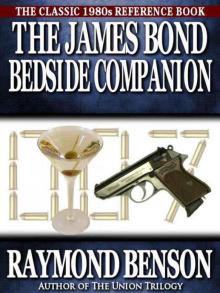 The James Bond Bedside Companion
The James Bond Bedside Companion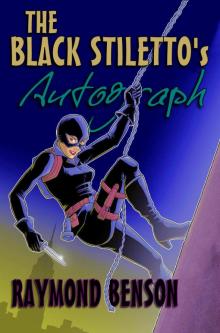 The Black Stiletto's Autograph
The Black Stiletto's Autograph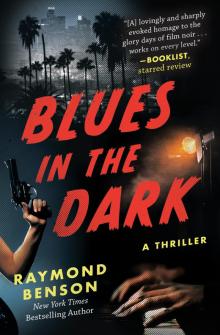 Blues in the Dark
Blues in the Dark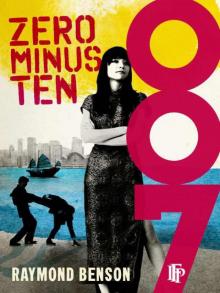 Zero Minus Ten
Zero Minus Ten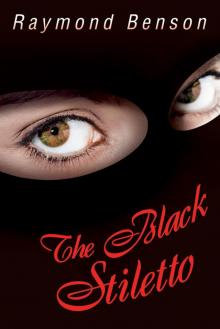 The Black Stiletto
The Black Stiletto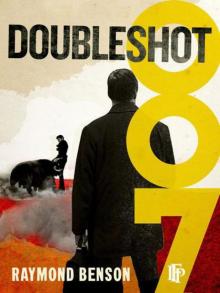 Doubleshot
Doubleshot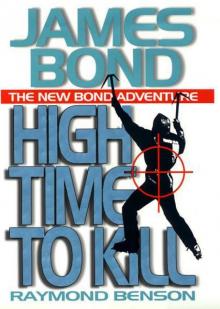 High Time To Kill rbb-3
High Time To Kill rbb-3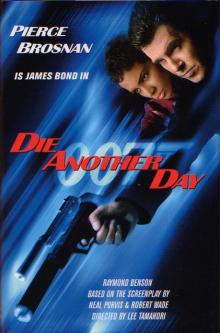 Bond Movies 07 - Die Another Day
Bond Movies 07 - Die Another Day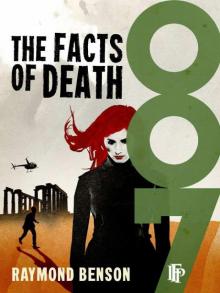 The Facts Of Death
The Facts Of Death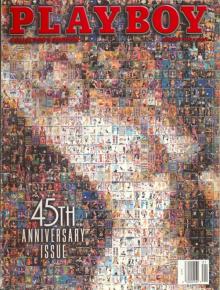 Midsummer Night's Doom
Midsummer Night's Doom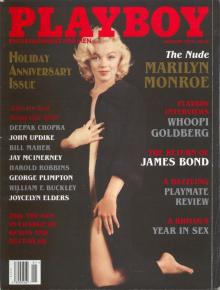 Blast from the Past
Blast from the Past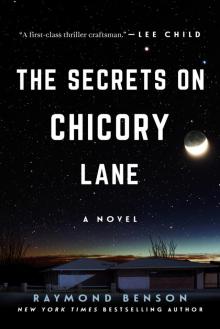 The Secrets on Chicory Lane
The Secrets on Chicory Lane High Time To Kill
High Time To Kill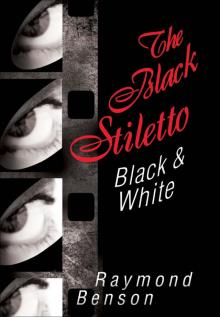 The Black Stiletto: Black & White
The Black Stiletto: Black & White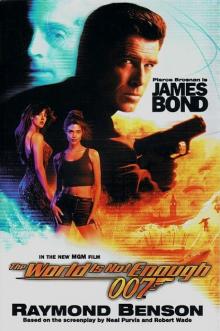 The World Is Not Enough jb-1
The World Is Not Enough jb-1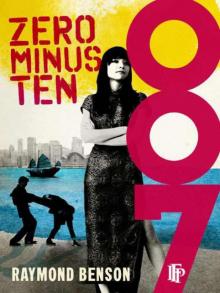 Zero Minus Ten rbb-1
Zero Minus Ten rbb-1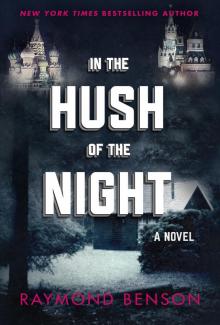 In the Hush of the Night
In the Hush of the Night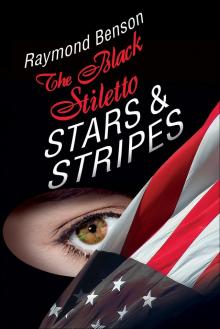 The Black Stiletto: Stars & Stripes
The Black Stiletto: Stars & Stripes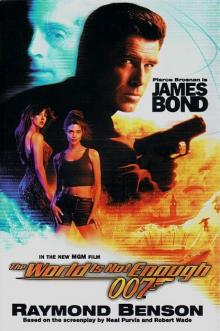 Bond Movies 06 - The World Is Not Enough
Bond Movies 06 - The World Is Not Enough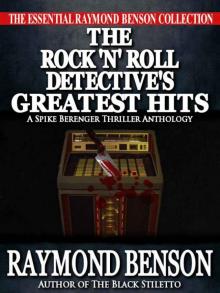 The Rock 'n Roll Detective's Greatest Hits - A Spike Berenger Anthology
The Rock 'n Roll Detective's Greatest Hits - A Spike Berenger Anthology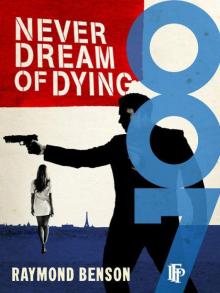 Never Dream Of Dying
Never Dream Of Dying